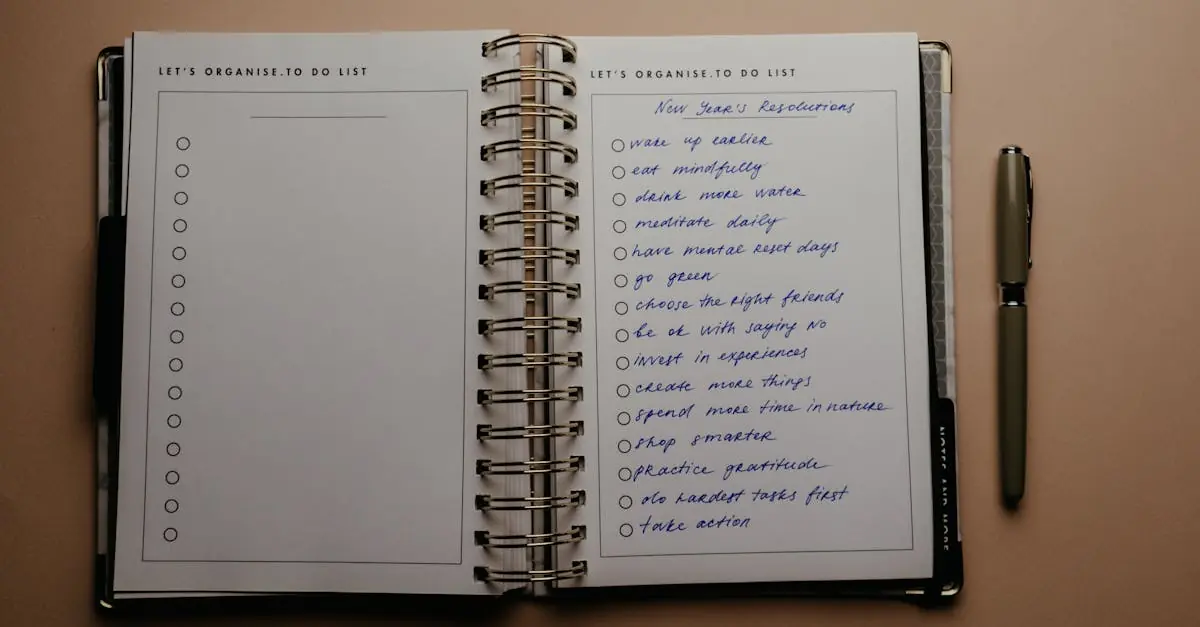In a world buzzing with distractions, achieving productivity can feel like trying to catch a greased pig at a county fair. Everyone wants to be the next productivity guru, but few know the secret sauce that turns ordinary days into triumphs. By adopting a few simple habits, anyone can transform their routine from a chaotic circus into a well-oiled machine.
Imagine breezing through your to-do list while others are still wrestling with their morning coffee. With the right strategies, it’s possible to find focus and unleash creativity. Whether it’s mastering the art of time-blocking or embracing the power of a digital detox, these habits can help anyone reclaim their time and boost their output. So, buckle up and prepare to dive into the delightful world of productivity habits that’ll have you working smarter, not harder.
Table of Contents
ToggleUnderstanding Habits For Productivity
Habits play a crucial role in enhancing productivity. By understanding how habits form and affect daily routines, individuals can streamline their efforts toward better efficiency.
The Science Behind Habits
Habits develop through repetition, creating neural pathways in the brain. This process triggers automatic responses, simplifying decision-making. Researchers show that around 40% of daily actions stem from habits. The habit loop consists of cue, routine, and reward, providing a framework for building effective habits. In practice, consistent triggers foster the development of positive behaviors. With time, individuals notice an increase in overall productivity as new habits replace less effective ones.
How Habits Influence Productivity
Habits shape daily priorities and routines. They dictate focus and energy management, ultimately determining how much can be accomplished. Positive habits, such as goal-setting and time management, directly correlate with improved outcomes. Conversely, negative habits can drain energy and disrupt workflow. Evidence suggests that individuals who maintain structured routines experience less decision fatigue. Ultimately, establishing constructive habits becomes crucial for enhancing productivity and achieving professional goals.
Essential Habits For Productivity
Adopting specific habits can significantly enhance productivity levels. Implementing effective techniques and routines allows for a more organized and focused approach to daily tasks.
Time Management Techniques
Effective time management involves various techniques tailored to individual preferences. Using the Pomodoro Technique, individuals can break work into intervals, typically 25 minutes in length, followed by short breaks. Another method, time-blocking, allocates specific blocks of time for particular tasks, ensuring dedicated focus. Utilizing tools like digital calendars promotes visibility of deadlines and commitments. Each technique encourages efficient use of time, leading to higher output and less overwhelm.
Prioritization Strategies
Prioritization helps individuals focus on the most critical tasks first. Utilizing the Eisenhower Matrix, tasks can be categorized based on urgency and importance, providing clarity on what to address immediately. The ABCD method further refines task lists, assigning values to ensure higher priority tasks receive more attention. Research indicates that successful prioritization can lead to a 23% increase in productivity. Frequent assessments of priorities ensure alignment with goals, keeping progress on track.
Daily Routines That Work
Establishing daily routines promotes consistency and enhances productivity. Starting the day with a morning routine, including exercise or meditation, sets a positive tone. Regular breaks throughout the day contribute to sustained energy levels. Incorporating time for reflection and planning in the evening assists in preparing effectively for the next day. Small, manageable adjustments to daily routines can lead to significant improvements in focus and efficiency over time.
Overcoming Common Productivity Pitfalls
Distractions often undermine productivity. Identifying and addressing these distractions can lead to more effective work sessions.
Identifying Distractions
First, recognize sources of distractions in the workspace. Common examples include cell phone notifications, noisy environments, and irrelevant web content. Completing a distraction audit helps pinpoint specific triggers. Individuals may find keeping a distraction diary useful, noting times and activities that led to lost focus. Identifying patterns in distractions fosters awareness, making it easier to devise solutions that target them directly.
Strategies to Stay Focused
Establishing a few strategies enhances focus during work. Time-blocking promotes structured schedules where specific tasks receive dedicated attention. Using the Pomodoro Technique, individuals can work in short bursts with regular breaks, leading to better concentration. Maintaining a tidy workspace reduces visual clutter, allowing for better mental clarity. Setting clear daily goals prioritizes tasks, helping to tackle the most critical items first. Regular check-ins on progress help to stay aligned with productivity objectives throughout the day.
Tools and Resources to Support Productive Habits
Various tools and resources exist to support productive habits and enhance overall efficiency.
Apps That Enhance Productivity
Numerous apps help streamline tasks and maintain focus. Todoist offers an intuitive interface for managing tasks, allowing users to prioritize effectively. Trello utilizes boards, lists, and cards, making project organization straightforward. Focus@Will provides music tracks scientifically designed to boost concentration. Forest gamifies productivity, encouraging users to stay focused by growing virtual trees. Evernote captures notes and ideas, promoting better organization across devices. Each app serves unique needs, and leveraging such resources can lead to improved productivity and focus.
Recommended Books for Building Habits
Several books extensively cover habit formation and productivity strategies. “Atomic Habits” by James Clear outlines actionable techniques for building positive habits and breaking negative ones. “The 7 Habits of Highly Effective People” by Stephen Covey offers a framework for prioritizing tasks aligned with personal values. “Deep Work” by Cal Newport emphasizes the importance of focused work for achieving high productivity levels. “Essentialism” by Greg McKeown advocates for focusing on what truly matters to maximize efforts. Each of these books provides valuable insights, reinforcing the connection between effective habits and productivity enhancement.
Embracing productive habits can lead to significant improvements in both personal and professional life. By integrating techniques like time-blocking and prioritization strategies into daily routines, individuals can streamline their workflow and enhance focus. Recognizing distractions and implementing strategies to minimize them is equally crucial for maintaining productivity.
Building positive habits through repetition not only simplifies decision-making but also fosters an environment where creativity can thrive. With the right tools and resources at their disposal, anyone can cultivate a more productive lifestyle. The journey to becoming more productive starts with small, consistent changes that can yield remarkable results over time.








